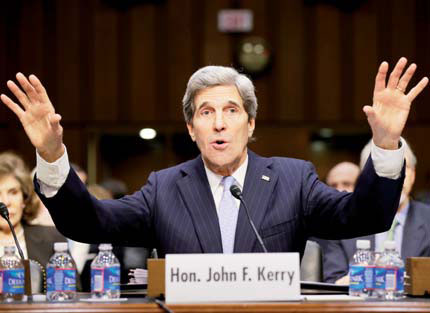Kerry to strengthen Sino-US relations
Updated: 2013-01-25 12:17
By Chen Weihua in Washington (China Daily)
|
||||||||
|
Senate Foreign Relations Chairman John Kerry sits before the committee he has served on for 28 years and led for the past four as he seeks confirmation as US secretary of state. J. Scott Applewhite / AP |
US Senator John Kerry, who is expected to replace Hillary Clinton as the secretary of state, says he wants to broaden the relationship with China.
Kerry said he envisions that China can play a much more significant role as a partner in any number of efforts globally.
"China may be viewed competitors in the market place, but we shouldn't be adversaries in some way that diminishes our ability to cooperate on a number of things," he told the Senate Foreign Relations Committee on Thursday during his confirmation hearing. He has chaired the committee since 2009.
Kerry said China is cooperating with the US on Iran and there may be more cooperation over the Democratic People's Republic of Korea and other parts in East Asia.
"There could be more we could do in other parts of the Far East, and hopefully we can build those relationships that will further that transformation. We make progress. It's incremental ... It's a tough slog," said the 2004 Democratic presidential candidate.
The 69-year-old, surrounded by his wife Teresa Heinz and other family members, said China and the US can find a better sense of mutuality of their interests and common goals they can work on.
Citing climate change, on which he has been a strong campaigner, Kerry said that China is going to double its emissions and "we got to get these folks into unified efforts".
Kerry said he supports the rebalancing policy in Asia which started less than two years ago, describing it as "critical" for the US to strengthen its relationship with China. But he is not convinced that increasing military influence is critical yet, adding that he would look at it more carefully after being confirmed.
Kerry told lawmakers that the US has more bases in the region than any other nation, including China. He also acknowledged the concern in China after the US increased the number of marines based in Australia.
"The Chinese ask what the United States is doing. They try to encircle us, what's going on and so every action has its reaction," said Kerry, the 69-year-old former Vietnam veteran, who later became an anti-war activist.
"We have to think thoughtfully about not creating a threat when there isn't one and understand where we can find bases for cooperation.
"I am not talking about retreating, I am simply trying to think about how we do this, not creating the reaction you don't like to create."
The US rebalancing policy in Asia has shifted more from the military front to the economic and trade front in the past year.
The senator from Massachusetts voiced his support for the Trans Pacific Partnership, which he said would establish greater leverage on the notion of broadly accepted rules.
However, China has always been suspicious of US intentions in pushing aggressively for the TPP, of which China and India will not be a part. China, on the other hand, has been supportive of another trade framework known as the Regional Comprehensive Economic Partnership.
Kerry pointed out that the US still faces significant challenges in China on intellectual property rights, market access and currency.
"China is, you know, the other sort of significant economy in the world and obviously has a voracious appetite for resources around the world, and we need to establish rules of the road that work for everybody," Kerry said.
Kenneth Lieberthal, a senior fellow at the Brookings Institution, a Washington-based think tank, praised Kerry as a good candidate for secretary of state.
"He is someone who believes strongly to know well the people you are dealing with, to understand their perspectives and their concerns," he said.
Lieberthal heard that privately Kerry feels that politics is the art of possible. "So if you want to understand what can be done, you've got to not only understand what your own interests are, but to understand the interest of the other side," Lieberthal said.
"When you understand both of those things, then you can figure out what you can accomplish together. That's very much his style of approaching things.
"I would think that bodes well for his being an effective secretary of state as well as in dealing with China, among other issues."
chenweihua@chinadailyusa.com
(China Daily 01/25/2013 page1)

 In Photos: 7.0-magnitude quake hits Sichuan
In Photos: 7.0-magnitude quake hits Sichuan
 Li Na on Time cover, makes influential 100 list
Li Na on Time cover, makes influential 100 list
 FBI releases photos of 2 Boston bombings suspects
FBI releases photos of 2 Boston bombings suspects
 World's wackiest hairstyles
World's wackiest hairstyles
 Sandstorms strike Northwest China
Sandstorms strike Northwest China
 Never-seen photos of Madonna on display
Never-seen photos of Madonna on display
 H7N9 outbreak linked to waterfowl migration
H7N9 outbreak linked to waterfowl migration
 Dozens feared dead in Texas plant blast
Dozens feared dead in Texas plant blast
Most Viewed
Editor's Picks

|

|

|

|

|

|
Today's Top News
Live report: 7.0-magnitude quake hits Sichuan, heavy casualties feared
Boston suspect cornered on boat
Cross-talk artist helps to spread the word
'Green' awareness levels drop in Beijing
Palace Museum spruces up
First couple on Time's list of most influential
H7N9 flu transmission studied
Trading channels 'need to broaden'
US Weekly

|

|








